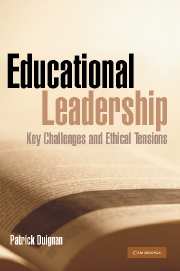Book contents
- Frontmatter
- Contents
- Acknowledgements
- Introduction and overview
- 1 Contemporary leaders and leadership under the spotlight
- 2 Key challenges for educational leaders
- 3 Leadership challenges as tensions
- 4 A framework for analysing tensions
- 5 Values and ethics in decision-making
- 6 A method for ethical decision-making
- 7 Shared and distributed leadership in schools
- 8 Why we need capable educational leaders
- 9 Why we need authentic educational leaders
- 10 Forming capable and authentic educational leaders
- References
- Index
4 - A framework for analysing tensions
Published online by Cambridge University Press: 05 June 2012
- Frontmatter
- Contents
- Acknowledgements
- Introduction and overview
- 1 Contemporary leaders and leadership under the spotlight
- 2 Key challenges for educational leaders
- 3 Leadership challenges as tensions
- 4 A framework for analysing tensions
- 5 Values and ethics in decision-making
- 6 A method for ethical decision-making
- 7 Shared and distributed leadership in schools
- 8 Why we need capable educational leaders
- 9 Why we need authentic educational leaders
- 10 Forming capable and authentic educational leaders
- References
- Index
Summary
The challenges and tensions faced by educational leaders in this study, and discussed in chapters 2 and 3, were complex and multidimensional. It was evident that most of the respondents in the study had no rigorous and systematic method for analysing and responding to these tensions. It seems clear that educational leaders require frames of reference for making choices that can encompass seemingly opposite considerations, values and ethical positions. This need is not well accepted, never mind understood or appreciated, by a majority of those who study and practice educational leadership and management. The traditional perspective of a world of certainty and precision that can be controlled through management techniques and strategies still tends to dominate educational leadership thinking and practice.
Frameworks are needed that help educational leaders appreciate that ‘the opposites are necessary to each other’ (Handy, 1994, p. 48). Handy advocates that leaders must learn to frame the confusion and find pathways through the paradoxes by understanding what is actually happening in a particular situation and by learning to be different (p. 3). They must break the bonds imposed by dualistic either/or mindsets and try to cultivate both/and thinking and decision-making approaches.
Proposed framework for analysing tensions
In a significant research study entitled ‘The Double-Headed Arrow: Australian Managers in the Business Context of Asia’, English (1995) referred to paradox as a tension situation that is primarily characterised by relationship and complementarity rather than polar opposites.
- Type
- Chapter
- Information
- Educational LeadershipKey Challenges and Ethical Tensions, pp. 63 - 73Publisher: Cambridge University PressPrint publication year: 2007



